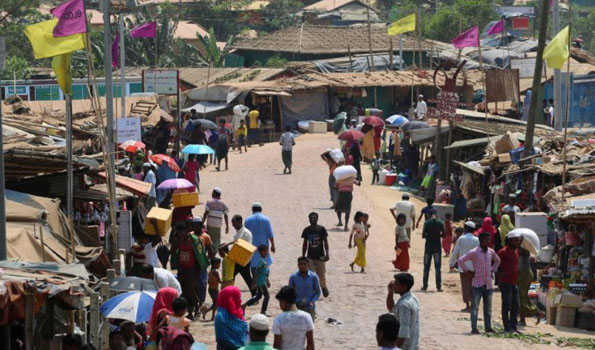Police in Bangladesh said Sunday that two Rohingya leaders had been murdered by a mob as the overall security of almost one million refugees in a sprawling set of camps becomes ever more precarious.

Faruk Ahmed, the police spokesman, said the two were killed at Camp 13 late Saturday in what he described as one of the worst attacks in recent months.
"More than a dozen Rohingya miscreants hacked Maulvi Mohammad Yunus, 38, who is the overall leader of Camp 13. They also killed Mohammad Anwar, 38, another leader. Yunus died on the spot and Amwar died at a hospital."
The Dhaka Tribune reported an increased presence of law enforcement officers at the scene following the attacks. No one has yet been taken into custody and charged for their involvement in the violence.
Who is responsible for the attack?
A senior leader within an elite unit of the police told AFP that a rebel group fighting the military in Myanmar, Arakan Rohingya Salvation Army (ARSA), was likely to blame.
"The internal clashes in Myanmar are impacting the security situation in the camps," he said.
Rohingya leaders and the nephew of one of the victims concurred, blaming ARSA as well.
Several of the group's members were charged after Mohib Ullah, a Rohingya leader who had once visited the White House, was murdered last September. Ullah's killing sparked a significant crackdown on the group with 8,000 of its members being arrested.
Why is there an uptick in violence now?
Gangs have fought for control of the drug trade in yaba methamphetamine pills, an illicit mixture of methamphetamine and caffeine, and there have been battles over turf for some time, though authorities say they have seen an increase in violence in recent months.
Civilian leaders among the refugees have been targeted specifically, with some being abducted while others have been killed.
Who are the Rohingya?
The military in neighboring Myanmar targeted the Rohingya community in 2017. That crackdown is now the target of a UN investigation as to whether acts of genocide occurred.
Hundreds of thousands fled across the border into Bangladesh, where they are being hosted in a sprawling set of camps in Cox's Bazar, near the border with Myanmar.
- Top News




